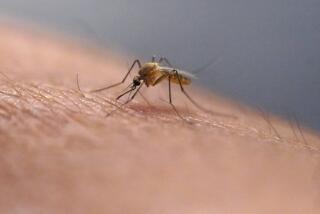Mosquitoes’ Key to Insecticide Resistance
- Share via
Mosquitoes carrying West Nile virus and a strain of malaria have developed a resistance to insecticides because of a single-letter mutation in their genetic code, scientists said.
Researchers at the University of Montpellier II in France said the alteration could be the cause of 25 years of resistance to insecticides among insects that carry the disease.
The mutation makes a key enzyme in the mosquitoes less sensitive to ingredients in some insecticides.
“The discovery of the ace-1 mutation that is responsible for insecticide resistance in mosquitoes opens the way to new strategies for pest management,” Mylene Weill said in a report in the science journal Nature.
West Nile virus can cause mild flu-like symptoms, or in some cases a more severe disease and death. It is common in Africa, where it was first diagnosed in 1937, and in southern Europe and the Middle East.
It appeared in the United States in 1999 and spread to Canada and the Cayman Islands.
Malaria affects from 300 million to 500 million people each year and kills up to 2.7 million -- mostly young children in Africa.
Weill and her colleagues found the mutation in 10 highly resistant strains of mosquitoes carrying West Nile virus and in some resistant African strains of a malaria-carrying mosquito.
Developing new insecticides that can specifically inhibit the mutant form of the enzyme could be crucial in overcoming the spread of resistance, they added.






